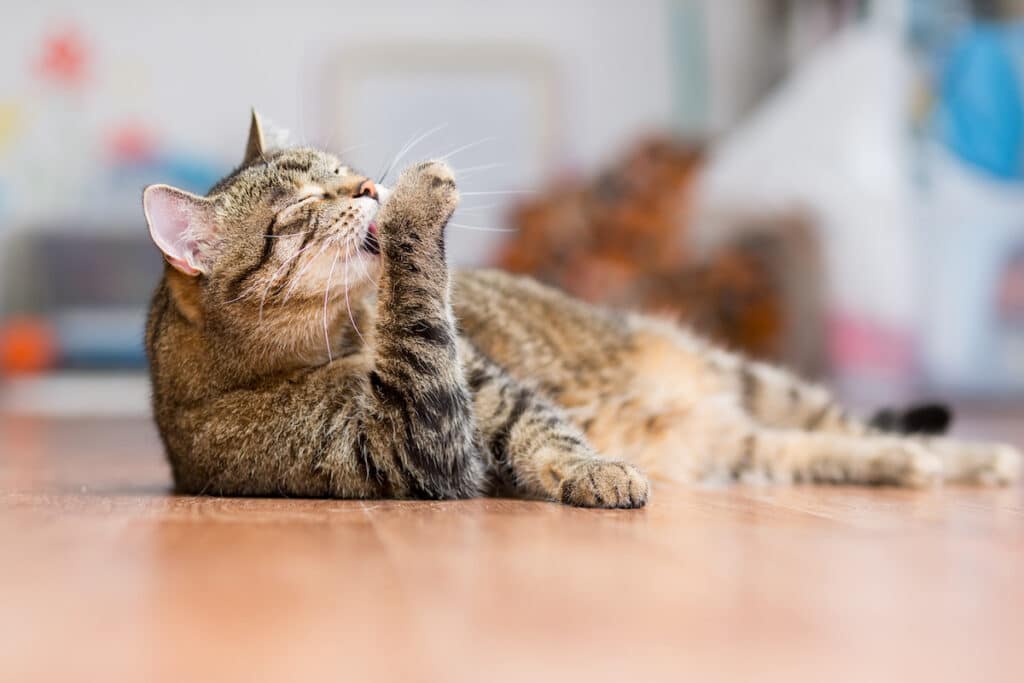Pamela Perry, a DVM and animal behavior expert at Cornell University’s College of Veterinary Medicine, says that cats usually spend a lot of time grooming themselves. Cats can groom themselves up to 4 hours per day! But how do you know if your cat is licking too much? “Cats groom often, so their owners usually don’t notice a problem until they see significant hair loss or skin lesions,” she explains.
Why Cats May Lick
William Miller, Jr., VMD, a board certified specialist in dermatology and professor at Cornell University’s College of Veterinary Medicine, suggests that when cats lick areas of their bodies, it is often because the area is either itchy or painful.
If pain is the source of discomfort, then the licking will be focused on the specific painful area. Examples include cases of disc disease or anal sac impaction. Conversely, with itchy diseases spreading throughout the body, licks will tend to be more widespread.
Dr. Miller says that some cats have a problem with licking themselves too much. We call these cats ‘fur mowers.’ The area being ‘mowed’ tells us what might be causing the problem. It could be anything from parasites in kittens to neurological diseases in older cats, but there is significant overlap,” he explains. For example, compulsive licking near the tail head may point to a flea infestation; while those with allergies to pollen or certain foods may lick their backs, abdomens or other areas more frequently.
Dr. Miller says that if a cat licks too much and causes balding, it is not normal. “Bald skin can get sunburned more easily,” he says. “Or it can get frostbite more easily.” If the cat’s tongue is not rough, there will be no infection. But if the tongue is rough and breaks the skin, then there could be a serious infection. And this could make the cat lick even more, creating a never-ending cycle.
Dr. Miller says that the way to stop “fur mowing” is to find and fix the problem. The problem could be something like fleas or lice, or too much fur. But sometimes the problem is not physical, it is psychological.
Dr. Perry says that cats usually like stability and knowing what to expect. So, if their routine changes, it can make them very upset. If a cat licks too much, it might be because they are anxious about something like moving or losing another pet in the home. Licking is considered a “displacement behavior.” That means it is something they do to try to make themselves feel better. But if the real problem is not fixed, then the licking could become a bad habit.
Cats have rough tongues that are really good for grooming. They’re almost too good for grooming, though, as licking too. much can tear out hair and create bald spots.
Does My Cat Lick Too Much
Dr. Perry says that if all medical problems have been ruled out, your cat licking too much is usually treatable as long as the root cause of stress in a cat’s life is discovered and fixed. If possible, she recommends making changes or introductions gradually; bringing familiar items (such as bedding) to a new home. Also try adding cat-friendly vertical space – high places where cats can retreat and feel safe. Keep their environment stimulating by finding a few minutes (ten to 15 minutes daily) to play with them each day.
Dr. Perry says that most cats like to interact with people. If you want to help your cat feel better, try doing things that they like– like cuddling or playing with their favorite toy. In some cases where a cat is very stressed, it might be necessary to get medication from a veterinarian to help them feel better.
Dr. Perry explains that some animals, like people who bite their fingernails, may lick themselves because it feels good and helps them relieve stress. Once they start licking, it can become a habit even after the original reason is gone. Usually, with help from either medication or time, the animal will stop licking within a month, according to Dr. Miller.














